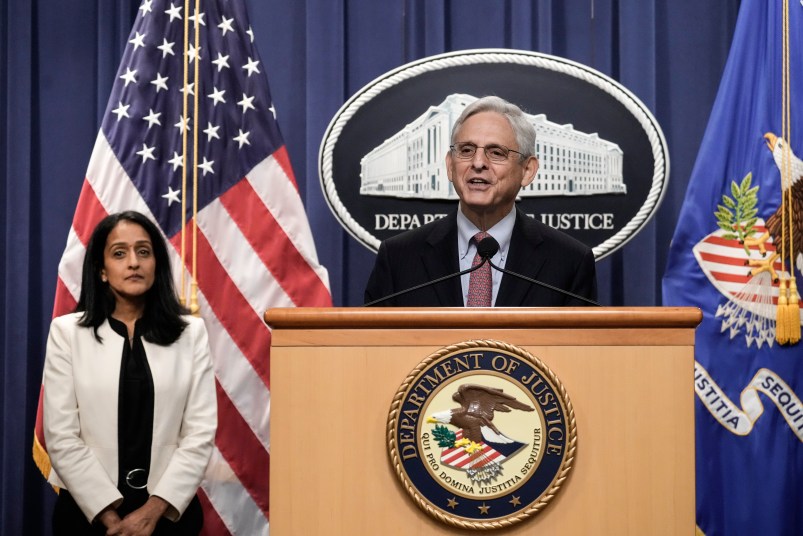The Justice Department sued the state of Idaho Tuesday over new abortion restrictions that allegedly put the lives of pregnant people in danger.
The suit came in response to the impending enforcement of Idaho’s 2020 “trigger” abortion ban, which as a result of the Supreme Court overturning Roe v. Wade is set to go into effect on Aug. 25. But any state whose abortion prohibitions provide no exception for protecting the health of mothers could be violating federal law, Attorney General Merrick Garland said at a press conference Tuesday.
The Idaho law prohibits abortions in all cases except documented cases of rape, or when “deemed necessary to prevent the death of the pregnant woman.”
But federal law is broader than that, the suit argued. It cited the Emergency Medical Treatment and Labor Act, or EMTALA, which requires hospitals receiving Medicare funds to stabilize anyone seeking care for an “emergency medical condition.”
Such emergencies apply not just to life-threatening situations, but also “those that place a patient’s ‘health’ in ‘serious jeopardy’ or risk ‘serious impairment to bodily functions’ or ‘serious dysfunction of any bodily organ or part,’” the suit noted. The complaint listed pregnancy-related emergencies including “ectopic pregnancy, severe preeclampsia, or a pregnancy complication threatening septic infections or hemorrhage.”
Amid a wave of reports of doctors denying emergency abortions to patients due to post-Roe restrictions, Health and Human Services Secretary Xavier Bercerra wrote to medical providers nationwide last month, reminding them of the requirements under EMTALA. Tuesday’s suit noted a July 29 letter the feds sent to Idaho officials, detailing concerns that the state’s new abortion law clashed with federal law. The suit noted, “The United States did not receive a substantive response.”
What’s more, the Idaho law’s “affirmative defense” language means doctors could be prosecuted for performing abortions in Idaho even under the narrow exceptions laid out in the law, the suit alleged. Physicians, in such instances, would be forced to affirmatively demonstrate that an abortion was necessary to protect the life of the mother.
Under the Idaho law, the suit argued, “Physicians will be faced with an untenable choice—either to withhold critical stabilizing treatment required under EMTALA or to risk criminal prosecution and potential loss of their professional licenses.”
“As a result of Idaho’s physicians being placed in this position, patients will suffer—including by having their care delayed or losing access to necessary health care that is guaranteed under federal law.”
The lawsuit was filed in federal court in Idaho, and seeks among other things a declaratory judgment stating that Idaho’s law violates the U.S. Constitution’s Supremacy Clause, and an injunction prohibiting the law’s enforcement.
In a press conference Tuesday announcing the suit, Garland said “any state law” that prevents hospitals from fulfilling their obligations under EMTALA would be a violation of federal law.
“If a patient comes into the emergency room with a medical emergency jeopardizing the patient’s life or health, the hospital must provide the treatment necessary to stabilize that patient,” the attorney general said.
“This includes abortion when that is the necessary treatment. Any state law that prevents a hospital from fulfilling its obligation under EMTALA violates federal law.”



